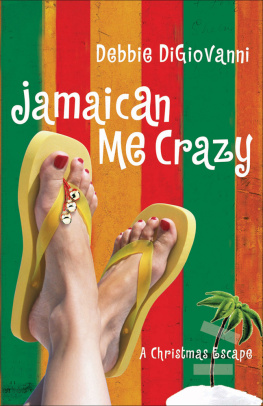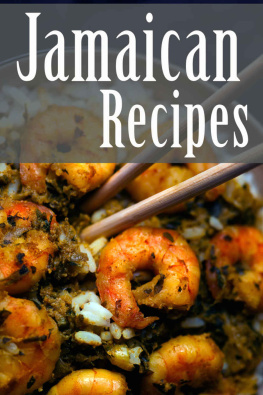

Miss Lou
Louise Bennett and Jamaican Culture
Mervyn Morris

First published in Jamaica, 2014 by
Ian Randle Publishers
11 Cunningham Avenue
Box 686
Kingston 6
www.ianrandlepublishers.com
Mervyn Morris, 2014
ISBN 978-976-637-866-0 (Pbk)
Epub Edition @ March 2014 ISBN: 978-976-637-873-8
NATIONAL LIBRARY OF JAMAICA CATALOGUING-IN-PUBLICATION DATA
Morris, Mervyn
Miss Lou: Louise Bennett and Jamaican culture / Mervyn Morris
p. : ill. ; cm.
Includes index
ISBN 978-976-637-866-0 (pbk)
1 Bennett, Louise, 1919-2006 2. Jamaica Biography
3. Jamaica Culture 4. Jamaica Social life and customs
I. Title
920 dc 23
First published in the UK in 2014 by
Signal Books Limited
36 Minster Road
Oxford OX4 1LY
www.signalbooks.co.uk
Miss Lou: Louise Bennett and Jamaican Culture. Copyright 2014 by Mervyn Morris. All rights reserved under International and Pan-American Conventions. By payment of the required fees, you have been granted the nonexclusive, non-transferable right to access and read the text of this e-book on screen. No part of this text may be reproduced, transmitted, downloaded, decompiled reverse-engineered, or stored in or introduced into any information storage and retrieval system, in any form or by any means, whether electronic or mechanical, now known or hereinafter invented, without the express written permission of Ian Randle Publishers.
Permission for inclusion of the copyrighted works of Louise Bennett has been obtained from and granted by the LBC Estate, executors: Judge Pamela Appelt and Fabian Coverly, during Jamaicas 50th year of celebration of Independence.
Cover Design: Ian Randle Publishers
Typesetting: Tora Kelly
Cover Images: Maria LaYacona; back: Gleaner Company
Printed and bound in the USA

Contents
Miss Lou

Acknowledgements
Thanks especially to Pamela Appelt and Fabian Coverley, executors of the Louise Bennett Coverley estate, for granting early access to material in Canada and for permission to quote from Louise Bennetts work.
I am also indebted to Mary Jane Hewitt, whose dissertation on Zora Neale Hurston and Louise Bennett has been an invaluable resource; and to Ruth Minott Egglestone who shared a chronological file on Louise Bennett and Eric Coverley which she created while researching the Jamaican Pantomime.
I am grateful for the help of many other individuals, including Peter Ashbourne, Yvonne Brewster, Gracie Cameron, Alvin Campbell, Frankie Campbell, Grub Cooper, Dorothy Cunningham, Leonie Forbes, Linda Gambrill, Tony Gambrill, Nick Gillard, Barbara Gloudon, Colleen Hall, Joan Andrea Hutchinson, Rosie Johnston, Emily Zobel Marshall, Lois Kelly Miller, Easton Lee, Tony McFarlane, Louis Marriott, Alma MockYen, Oliver Samuels, Maureen Warner-Lewis and Marjorie Whylie.
I also wish to thank
The British Broadcasting Corporation Archives, Caversham
The British Library, London
The Institute of Jamaica
The Jamaican Language Unit, University of the West Indies, Mona
The Little Theatre Movement, Jamaica
McMaster University Library, Hamilton
The National Library, Jamaica
Talawa Theatre Company, London
The University of the West Indies Library, Mona
The University of the West Indies Press
The author and the publishers thank the National Library of Jamaica, the Gleaner Company, the Jamaica Tourist Board, the Little Theatre Movement, Dr Owen Minott and the Louise Bennett-Coverley Estate for permission to reproduce photographs.
Introduction
When Louise Bennett died in July 2006, she was mourned internationally. Substantial obituaries (not only in Jamaica and the Caribbean but also in New York, Toronto, London and other places) extolled her extraordinary contribution. Miss Lou had lived an inspirational life as poet, researcher and actor, spreading delight in Jamaican heritage and showing that the language most Jamaicans speakJamaican Creole (dialect, patois, nation language)is worthy of respect.
Jamaicas First Lady of Comedy, she was an expert performer who fulfilled engagements in many parts of the world. She communicated effectively even with people not familiar with Jamaican Creole. She would give the gist of an item in Standard English before launching into the Creole, and find that very soon the audience was responding well. Various recordings confirm that, even in her seventies, she had formidable energy and a charismatic ability to connect.
Her voice was wonderfully flexible, changing pitch and texture as the moment required. As with her voice, so with her body language. Although she had an ample figure, she was remarkably light on her feet, and she could say volumes by the smallest physical alteration: the sudden, well-timed glance; the raising of the eyebrows perhaps; self-parody made lucid in a shallow bow.
She starred in pantomimes, was recorded singing Jamaican folksongs, did regular radio broadcasts and hosted a childrens television show. She taught drama. She wrote articles and gave lectures on Jamaican culture. She published books of poems and Anancy stories.
In the early decades of her career she was often taken to be merely an observant entertainer. She was always more than that. I believe in laughter, she declared.
As Edward Baugh has pointed out, In her commitment to Creole and to the common peoples voice, Bennett was one of the most revolutionary poets of the 1940s, though she was generally not recognized as such. Working in the language of the majority, she had many indications of their approval; and some members of the cultural establishment were supportive. But at every stage in her career she was opposed by persons anxious to defend Standard English against what they considered the virus of Creole. Some people are not convinced that Jamaicans can, and ought to, master both languages.
Louise Bennett grew up in humble circumstances. Later, whenbecause, by then, she was educated and a property-ownershe was identified as middle class she resisted the categorization: I think I speak to all Jamaica, she said. I cant feel that I belong to any class or that I write for any class.
*
This book examines the legacy of Miss Lou (the Hon. Louise Simone Bennett-Coverley, OM, OJ, MBE, Hon. D. Litt.). It traces her life from beginnings through to her local and international eminence, and discusses aspects of her work.
See Recommended Books and Recordings.
Quoted by Rex Nettleford in Louise Bennett, Jamaica Labrish (Kingston: Sangsters Book Stores, 2005 reprint), p.10. See also Bennett on Bennett , Louise Bennett interviewed by Dennis Scott, Caribbean Quarterly Vol. 14 Nos 1 & 2, March-June 1968, p.97. The interview is reprinted in Hinterland ed. E. A. Markham (Newcastle-upon-Tyne: Bloodaxe, 1989), pp.45-50.
Humour becomes, as it were, the expression of a peoples will to live... (Nettleford) Jamaica Labrish , p.22.
















